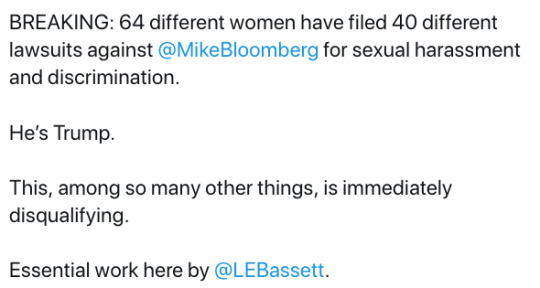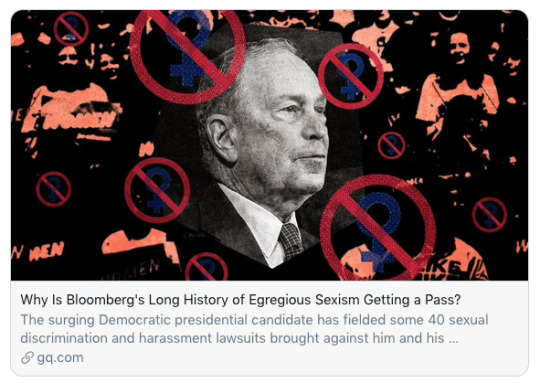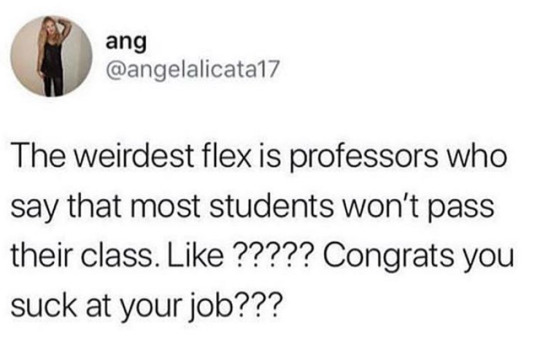Photo


John Singleton and his muse Janet Jackson filming Poetic Justice in California during the L.A Riots in April of 1992.
He spoke about where Janet Jackson came up with the concept for her now iconic braids in an interview with Essence recently:
http://www.essence.com/2013/07/23/exclusive-john-singleton-20th-anniversary-poetic-justice-working-janet-jackson-and-tupac/
554 notes
·
View notes
Text
Yeah sex is cool but have you ever been on tumblr before December 17 2018?
318K notes
·
View notes
Text
We can't get rid of slavery, the economy will collapse!
We can't get rid of child labor, the economy will collapse!
We can't have 8 hour work days, the economy will collapse.
What? The workers want TWO days off a week? Don't they know the economy will collapse?
101K notes
·
View notes
Photo






Michael Bloomberg has said the following:
- “I’d fuck that in a second,”
- “I’d do that piece of meat…”
- “If women wanted to be appreciated for their brains they’d go to the library instead of to Bloomingdale’s”
- Called women: “fat broads” & “horse-faced lesbian.”
- “I know for a fact that any self-respecting woman who walks past a construction site and doesn’t get a whistle will turn around and walk past again and again until she does get one.”
- Testified that he wouldn’t call the rape allegation genuine unless there was “an unimpeachable third-party witness.”
- “If you looked like that, I would do you in a second.”
- Told female employee to “Kill it!” when she informed him she was pregnant.
- “does everything, including blowjobs. I guess, that puts a lot of you girls out of business.”
[x] [x]
2K notes
·
View notes
Photo



I hope I am not stepping too far out of my lane by posting this. Sky Williams made a few tweets about YouTube’s way of “celebrating” Black History Month and I thought it was important for people to see this criticism of YouTube.
37K notes
·
View notes
Photo

February 13, 1918 - Jazz Arrives in Europe
Pictured - James Reese Europe and the Harlem Hellfighters band.
The French had been living with war for years now, and the endless convoys of guns and soldiers no longer excited crowds as they once had. That was until the Americans began arriving in 1917. French crowds gawked at the endless ranks of young, tall soldiers from the New World, come to help out the Old. But it was their music, as much as their arms, that excited the French.
The U.S. Army’s 369th Infantry Regiment had arrived in Brest in December. There were many African Americans in the army, but the majority never left the harbor they had landed in in France. America’s Jim Crow politics meant a segregated army, and giving guns to black men was anathema to most white Americans. Most black men ended up in labor battalions, often without uniforms, but the 369th was luckier. Made up of black enlisted men with both black and white officers, the New Yorkers of the “Harlem Hellfighters” were destined for combat, and received training from experienced French troops that winter.
The Hellfighters would receive their share of attention in due time, but for now their band commanded the spotlight. The aptly named James Reese Europe had organized the regiment’s band out of some of the best jazz players in the country. Europe introduced America to the foxtrot in 1914. Now he introduced Europe to jazz.
The regimental band launched a series of concerts in Nantes in February 1918, and Europe would never sound the same again. The drums, saxophones, and horns were unlike anything the bewildered Nantais had ever seen. They loved every minute of it. “When the band had finished and the people were roaring with laughter, their faces wreathed in smiles, I was forced to say that this is just what France needed at this critical moment,“ wrote one of the band members, Noble Sissle, in his memoirs. The jazz age had begun.
*Correction - The initial post mistakenly said 1917, not 1918.
327 notes
·
View notes
Photo

Granville Woods, from Cosmopolitan Magazine, 1895. Woods held over 50 patents and made several contributions to railway electrification.
150 notes
·
View notes
Photo







New from Lee & Low Books Inc, writer Joan DiCicco, and illustrator Ebony Glenn, The Unstoppable Garrett Morgan.
Here’s the Kirkus review:
“An accessible first look at a celebrated inventor in the black community.Garrett Morgan has been credited with the invention of the traffic light but is often overlooked in favor of other famous black innovators, such as George Washington Carver and Charles R. Drew. Debut picture-book author DiCicco gives young readers a solid overview of Garrett Morgan’s wide-ranging versatility. The account of his humble beginnings as part of a Kentucky sharecropping family highlights how his circumstances led him to solve problems creatively. When he left for the North, he advanced his education with private tutoring. DiCicco uses affirmative vocabulary like “unstoppable” and “brave” to describe his resilience and determination in life—an attitude that led to his decision to marry a white woman before interracial marriages were federally legal. The bulk of the book is devoted to his invention of a piece of safety apparatus that ensured a supply of fresh air to firefighters before turning to the invention of the traffic light. The racism that he encountered along the way is not soft-pedaled. A detailed timeline and bibliography steer readers to resources that will enable them to further explore his life. Glenn supplies earth-toned paintings that give a sense of the period and evoke mid-20th-century Disney cartoons.A stirring tribute to black excellence.“
106 notes
·
View notes
Text
Being Black and “POC” are not the same thing. Period.
29 notes
·
View notes








